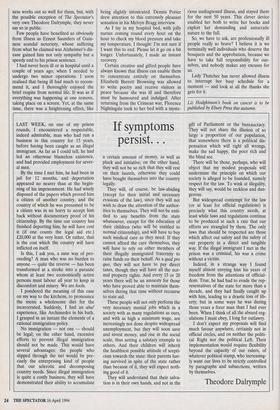If symptoms
persist.. .
LAST WEEK, on one of my prison rounds, I encountered a respectable, indeed admirable, man who had run a business in this country for 15 years, before having been caught as an illegal immigrant. As far as I could tell, he had led an otherwise blameless existence, and had provided employment for sever- al men.
By the time I met him, he had been in jail for 12 months, and deportation appeared no nearer than at the begin- ning of his imprisonment. He had wisely disposed of the papers which proved him a citizen of another country, and the country of which he was presumed to be a citizen was in no hurry to accept him back without documentary proof of his citizenship. By the time our country has finished deporting him, he will have cost it (if one counts the legal aid etc.) £20,000 at the very least. Or rather, that is the cost which the country will have inflicted on itself.
Is this, I ask you, a sane way of pro- ceeding? A man who was no burden to anyone — quite the reverse — has been transformed at a stroke into a parasite whom at least two economically active persons must labour all year to keep in discomfort and misery. We are fools.
I pondered the meaning of this case on my way to the kitchens, to pronounce the menu a wholesome diet for the incarcerated. Suddenly, I had an aha! experience, like Archimedes in his bath. I grasped in an instant the elements of a rational immigration policy.
No immigration — not one — should be legal; on the other hand, excessive efforts to prevent illegal immigration should not be made. This would have several advantages: the people who slipped through the net would be pre- cisely the enterprising kind of people that our sclerotic and decomposing country needs. Since illegal immigration is quite a costly business, they will have demonstrated their ability to accumulate a certain amount of money, as well as pluck and initiative; on the other hand, they will not be so rich that they will rest on their laurels, otherwise they could have bought themselves into the country legally.
They will, of course, be law-abiding (except for their initial and necessary evasions of the law), since they will not wish to draw the attention of the author- ities to themselves. They will not •be enti- tled to any benefits from the state whatsoever, except for the education of their children (who will be entitled to normal citizenship), and will have to buy such medical care as they need. If they cannot afford the care themselves, they will have to rely on other members of their illegally immigrated fraternity to raise funds on their behalf. As a quid pro quo, they will not have to pay direct taxes, though they will have all the nor- mal property rights. And every 15 or 20 years there will be an amnesty for those who have proved able to maintain them- selves during that time without recourse to state aid.
These people will not only perform the very necessary menial jobs which in a society with as many regulations as ours, and with as high a minimum wage, are increasingly not done despite widespread unemployment, but they will soon save and invest money, and rise in the social scale, thus setting a salutary example to others. And their children will inherit the healthiest possible attitude of scepti- cism towards the state: their parents hav- ing survived in spite of the state rather than because of it, they will expect noth- ing good of it.
They will understand that their salva- tion is in their own hands, and not in the gift of Parliament or the bureaucracy. They will not share the illusion of so large a proportion of our population, that somewhere there is a political dis- pensation which will right all wrongs, make the sad happy, the poor rich and the blind see.
There will be those, perhaps, who will object that my modest proposals will undermine the principle on which our society is alleged to be founded, namely respect for the law. To wink at illegality, they will say, would be reckless and dan- gerous.
But widespread contempt for the law (or at least for official regulations) is precisely what this country needs, at least while laws and regulations continue to be produced at such a rate that our efforts are strangled by them. The only laws that should be respected are those which affect our safety and the safety of our property in a direct and tangible way. If the illegal immigrant I met in the prison was a criminal, his was a crime without a victim.
Indeed, in a strange way I found myself almost envying him his years of freedom from the attentions of official- dom. True, he had had to evade the rep- resentatives of the state for more than a decade, and they had finally caught up with him, leading to a drastic loss of lib- erty; but in some ways he was during those years a freer man than I had ever been. When I think of all the absurd reg- ulations I must obey, I long for outlawry.
I don't expect my proposals will find much favour anywhere, certainly not in official circles, and on neither the politi- cal Right nor the political Left. Their implementation would require flexibility beyond the capacity of our rulers, of whatever political stamp, who increasing- ly want our lives to be strictly controlled by paragraphs and subsections, written by themselves.
Theodore Dalrymple


























































 Previous page
Previous page